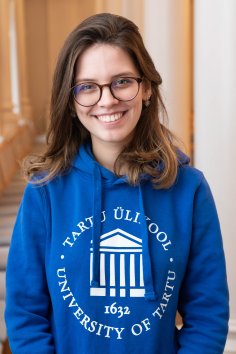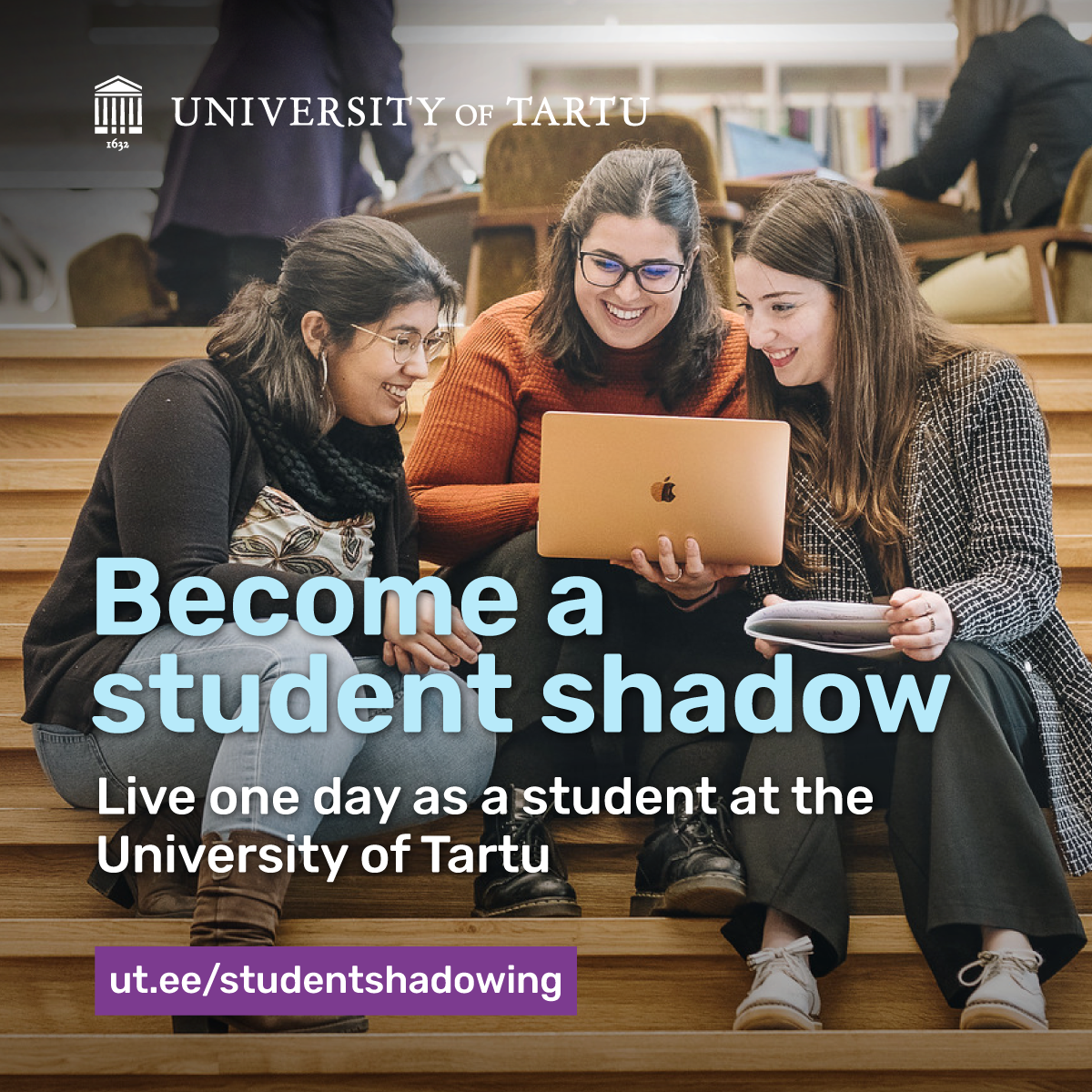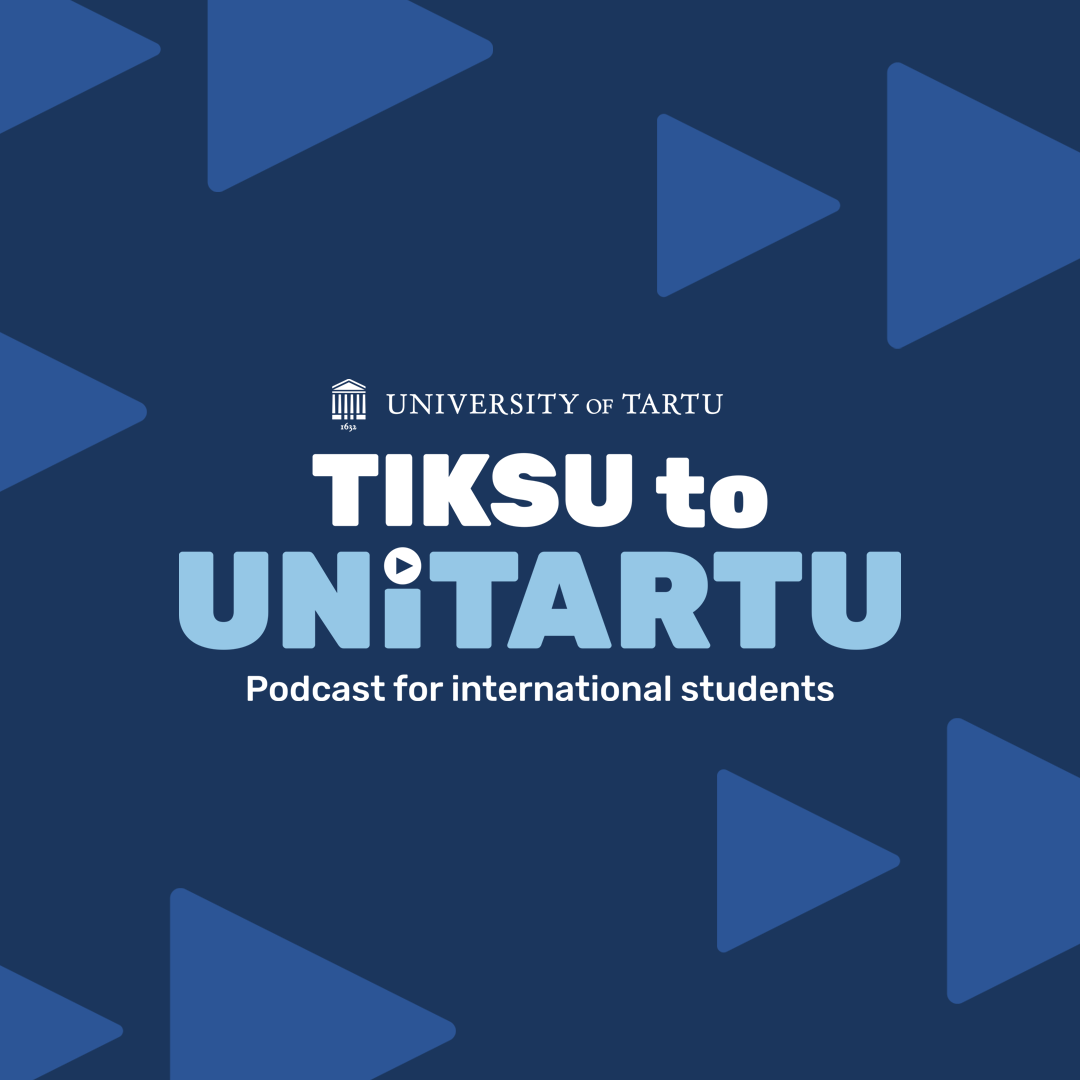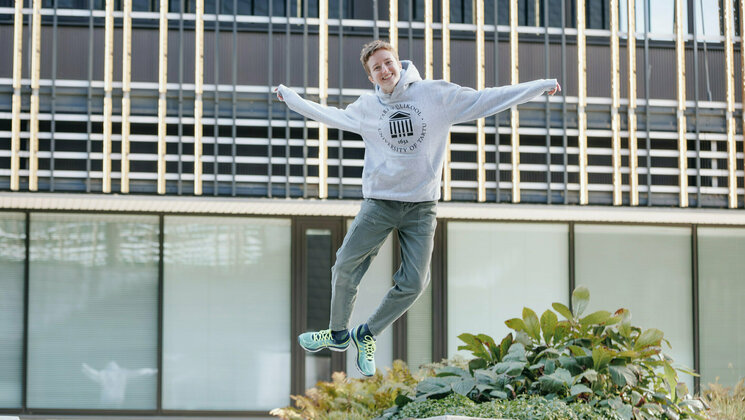Innovation and Technology Management
Master's
2 January
15 March
30 April
1 September
- You can receive two diplomas by spending your second year at Ghent University (Belgium).
- An interdisciplinary programme combines management, innovation, digitalisation and IT.
- Turn your business ideas into reality and develop your own company during your studies.
- After graduation, you can work as an innovation or process manager, start your own company or work in innovation policy or digitalisation.
- The University of Tartu belongs to the top 350 universities in the world (see Rankings and Surveys).
The international master's programme in Innovation and Technology Management aims to educate specialists who can implement ICT solutions to management processes of enterprises and thus help companies grow through more added value. Qualified students should have a bachelor's degree or equivalent in economics, mathematical sciences, or technology sciences (including IT).
We welcome students who would not only like to be programmers or system managers but are also interested in management, innovation and entrepreneurship. We can also turn it another way around – students who are already interested in the latter but would like to know more about implementing ICT solutions to those processes.
I am happy to see that the University of Tartu, my alma mater, offers this master's degree programme. It is "ICT plus", teaching raw technology and how to make the best use of it in a business environment. Today, digital skills are an essential requirement for people to get ahead in society and the modern workplace. People increasingly need and rely on ICT - whether programmers, software developers or digital enthusiasts keen to start their own tech business. This course takes digital skills to the next level – into management, using innovation to create the competitive companies of tomorrow, small and large. As we build a Digital Single Market in Europe, digital technologies need to be fully integrated into the industry, business and public services. This international course will develop and nurture our innovation and ICT managers of the future in Estonia and beyond.
The Innovation and Technology Management programme is a uniquely designed curriculum to train business leaders with a profound ability to implement ICT solutions within company processes. Business data analysis, project management, IT, and management skills are a few keywords that describe the programme.
Graduates of the programme will be able to analyse and interpret companies' data on strategic and operational levels and develop innovative and digital products and strategies. Therefore, the programme is implemented jointly by the School of Economics and Business Administration and the Institute of Computer Science.
Two years, two diplomas (double degree programme with Ghent University, Belgium) and international experience

The double degree programme offers students several compelling advantages. First, the students can obtain two diplomas from the University of Tartu and Ghent University within two years of study. Second, they have the unique opportunity to split their studies between Estonia and Belgium. Third, the students benefit from international experience, studying alongside peers from Ghent University, attending lectures by professors at both institutions and receiving dual guidance on their master’s theses.
The Innovation and Technology Management programme is a uniquely designed curriculum that combines business and IT. Throughout their studies, students engage in various courses that prime them for careers in leading Estonian and international corporations. Students undergo traineeships at leading banks and companies, both in Estonia and abroad, and have the opportunity to complete traineeships through the Erasmus programme. Graduates of the Innovation and Technology Management programme easily find work in the largest companies in Estonia, such as Bolt, TransferWise, Nordea Bank, and Swedbank, as well as in international companies. Some students have entered PhD programmes and are successfully building bright academic careers.
Read the complete overview of the programme by the Programme Director, Iuliia Trabskaia, here.
What will you get from this programme?
After completing the master's programme in Innovation and Technology, you:
- have a systemic overview of innovation theories and innovation policy;
- have deep knowledge in some field of research and application of innovation or technology management;
- are independently able to identify and formulate research questions in the field of innovation and technology management as well as find suitable methods to answer those;
- can collect, analyse and interpret data of a company from strategic and operational levels using appropriate methods and evaluation criteria to measure the productivity of the company;
- can use different methods to analyse company business processes to propose improvements and measure implementation efficiency;
- can do business with digital products and manage those;
- are familiar with developments in technology and have a positive attitude towards life-long learning;
- are collaborative, can communicate with different stakeholders, and can lead meetings and workshops.
Double degree programme with Ghent University
Ghent University (Belgium) and the University of Tartu have established a double degree master's programme. The programme started in the academic year 2024/2025. The double degree programme allows you to earn two accredited degrees from two universities.
Since the establishment of the double degree programme, you can choose between two study tracks:
I Innovation and Digital Management – you will study at the University of Tartu for two years. However, you still have the option (but no obligation) to study abroad with any exchange programme. In this track, we prepare specialists who can implement ICT solutions to companies' processes to aid change and growth. Latter is an integral part of the added value creation. You will have the skills to manage a business in modern conditions, quickly adapt to market needs, and work in physical and digital businesses. You will receive a diploma from the University of Tartu.
II Analytics for Business – double degree track. You will study your first semester at the University of Tartu and your second semester at Ghent University. For the second year, you return to the University of Tartu. Students choosing this study track do not need to pay extra for their studies at Ghent University. In the framework of the track, we are preparing future market leaders who are ready to make data-driven and build company development strategies. You will be equipped with company management skills and the skills to analyse data and develop innovative strategies. You will receive two diplomas with the following degrees:
- Master of Arts in Innovation and Technology Management (University of Tartu)
- Master of Science in Business Engineering (Ghent University)
The students will be selected for their study track at the time of admission to the master's programme. Upon submitting your application in DreamApply, please indicate your preferred study track: Tartu (I) or Tartu and Ghent (II). Even if you are not admitted to your chosen study track, you will still be considered for the other alternative study track.

Ghent University
Ghent University is a public research university and one of the most prestigious universities in Belgium. It belongs to the top 100 of the world's universities. The university considers itself a pluralist university, meaning it’s not connected to any particular religion/ideology and is open to all students regardless of their background.
Ghent University has the international accreditation AACSB.
Extracurricular activities
In addition to the study programme, you can join several practical programmes to support your development, grow your network and learn from international mentors worldwide.
- CDL (Creative Destruction LAB, read more here) brings together experienced founders of unicorns, and together with world-leading experts, you will help scale innovations underpinned by the digitisation of human societies. As a student, you can gain valuable insights from the leading experts and startup ecosystem. Students can polish their future tech and marketing skills and work directly with the startups they like to help them scale up quickly. You can take Creative Destruction Lab (CDL) courses besides your main curriculum and expand your network even more.
- Wharton Global Course (read more here) is a collaboration programme between the University of Tartu, the Wharton School of the University of Pennsylvania and the Stockholm School of Economics in Riga. You will explore more deeply how these nations have transformed their economies and policies by prioritising digital innovation, entrepreneurship and technology commercialisation. Our students benefit most from expanding their international network and learning about Estonian and Latvian unicorns and other fast-growing companies by solving their practical business problems. This way, we bring value to students and local companies in Tartu. Our partners have been, for example, Bolt, Pipedrive, NPV, Cybernetica, Foxway and others. You are very welcome to take these courses while studying here.
- We have been taking the lead also in organising the most start-up-minded business festival in the Baltics – the annual sTARTUp Day (read more here) and Delta Trends Day (read more here). You can help us organise this event while you are studying here. You can start with simple tasks, advance to international communication, and organise specific side events.
Programme highlights in media
- Watch here the programme director talk about the master's programme in Innovation and Technology Management during Virtual Open Day 2024.
- Watch the programme director talk about the master's programme in Innovation and Technology Management and the discussion round of master's students in the field of business management during the Online Open Doors Week 2022.
- Watch 10 questions with an Innovation and Technology student.
- Watch Alumni Talks: Researching and applying process mining - an innovative technology changing the way companies do business by Kateryna Kubrak (MA in Innovation and Technology Management).
See the two specialisation modules, “Innovation and Digital Management” and “Analytics for Business”, in the modules block below.
Curriculum version:
More info: Study Information System
School of Economics and Business Administration
The School of Economics and Business Administration is part of the Faculty of Social Sciences, with a history of more than 75 years of teaching business and economics. It has a leading role in Estonian economic and business education with internationally qualified and experienced staff.
The School of Economics and Business Administration is Estonia's top research centre in economics, international business and management. The school aims to provide a vibrant research environment linked to international centres of excellence and produces high-level academic and policy-relevant economic analysis.
Read more about the School of Economics and Business Administration here.
The School of Economics and Business Administration is located in the University of Tartu Delta Centre. The centre brings together a vibrant community of students, researchers and innovators in computer science, robotics, technology, mathematics, statistics, economics, management and business. The centre combines learning, excellence in research and the challenges of business and society, creating innovative solutions for economic and social progress.
Read more about the University of Tartu Delta Centre here.
Teaching Staff of the Innovation and Technology Management programme
- Iuliia Trabskaia, Programme Director of Innovation and Technology Management
- Mustafa Hakan Eratalay, Lecturer in Econometrics
- Kadri Ukrainski, Professor in Research and Innovation Policy
- Maryna Tverdostup, Economist, Vienna Institute for International Economic Studies, Lecturer in Economic Modelling, University of Tartu
- Andres Võrk, Head of Chair of Economic Modelling, Junior Lecturer in Econometrics
- Jaan Masso, Associate Professor in Applied Econometrics
- Maaja Vadi, Professor of Management
- Mervi Raudsaar, Head of Chair of Entrepreneurship, Associate Professor of Entrepreneurship
- Elchin Aghazada, Junior Research Fellow in Economics
- Eduard Ševtšenko, Associate Professor of Information Systems

Visit us virtually
Explore Tartu, the School of Business Administration and Economics, and the student dormitories through the university's virtual tour.
The Innovation and Technology Management master's programme prepares you for the future by upskilling digital and managerial competencies. After graduation, students can work as innovation or process managers in any company that is already implementing or planning to implement ICT solutions in their processes. Students can also start their own company, especially as a consultation business in implementing ICT solutions or work in the public sector in innovation policy or digitalisation. Student can also continue their studies at the doctoral level.
Alumni story - Kateryna Kubrak

Why did you choose to study this programme at the University of Tartu?
The Innovation and Technology Management programme offered a perfect mix of IT and business courses. After my Computer Science bachelor's, this was exactly what I was looking for. The deciding factor was excellent feedback from acquaintances who, at the time, were students of the programme. I never regretted my choice!
How important of a stepping stone was the University of Tartu for you in your career?
The University of Tartu changed my life completely! It was at UT where I got to know my current field of work (business process management). I found the field so interesting, and UT is such a great place to study that I decided to continue with a PhD programme here. If not for the master's programme in Innovation and Technology Management and UT, I really struggle to imagine where I would be now.
What were the most exciting courses you took at the University of Tartu?
Software Product Management, Business Analysis and Business Process Management from the Institute of Computer Science were my favourite courses in the programme. I use the knowledge I gained from them every day in my work to this day. The courses are very practical and are taught by practising experts, which makes them even more intriguing. Later, I became a teaching assistant at SPM and became even more excited by this course!
Would you recommend your programme to others who share your interests?
I would definitely recommend this programme to everyone who's searching for a programme that mixes IT and business sides. Not only would I do that, I actually do that regularly.
Kateryna graduated from the master's programme in Innovation and Technology Management in 2021. She is from Ukraine.
Admission requirements for Innovation and Technology Management
- bachelor’s degree or equivalent qualification (must be obtained by the end of July) in economics, mathematical sciences, technology sciences (including IT) – please see our country-specific document requirements
- English language proficiency – please see our acceptable tests and exempt categories
NB! The restrictions for the citizens of the Russian Federation are specified here.
Applications are evaluated based on
- the score of the motivation letter (yields 60% of the final score)
- the average grade of the previous study level (yields 40% of the final score)
The motivation letter must be submitted with your online application by 15 March at the latest.
The motivation letter consists of two parts: a written part (essay) and a video recording.
1. Written part (essay)
The essay should be written in English, contain approximately 3000-3500 characters with spaces and contain the following aspects:
1) Explanation of which innovation and/or technology topics are attractive for the student to write the master’s thesis. The applicant should propose a potential master’s thesis topic and
a) explain the research topic, including what is novel about it
b) motivate why it is interesting and important to study this topic
c) discuss how to explore this topic and what would be the methodology
2) Description of the innovation and/or technology career that the applicant would like to follow, which
a) explains what attracts the applicant to this career path
b) discusses how the ITM programme would help to achieve this career goal
c) argues what would be the biggest challenges in achieving this career goal
2. Short video CV
The applicant should record a video of up to 3 minutes in length, where the applicant’s face is clearly visible, and voice clearly audible. The video should be in the “pitch” format: thoroughly thought out, covering the catchiest attributes of the applicant. The video does not have to be done professionally – for example, it can be produced with a smartphone camera or webcam of the computer.
NB! The applicant must include a link to the video file in the motivation letter. When submitting the video link make sure the video can be accessed by anyone reading the motivation letter.
The video should address the following aspects:
a) highlights from the applicant's CV, including how the applicant’s background (previous studies and/or work experience) is related to ITM programme;
b) qualifications and job/entrepreneurial experience (if applicable) to help the student complete the studies in ITM programme and to achieve the career goal stated in the motivation letter;
c) if the student has programming knowledge in Python and/or R; has taken Statistics and Econometrics courses before, it is good to mention here;
d) which courses and topics from the ITM programme curriculum would support the career goal stated in the motivation letter.
Evaluation criteria for the motivation letter
- argumentation regarding the career goals and ITM programme´s contribution in a future career (max 15 points);
- the skills of argumentation in written text (max 15 points);
- the ideas for potential master´s thesis – idea, aim, topicality of the research, previous literature on the topic, proposed methods (max 30 points);
- in the video CV – public speaking skills, structure of the speech, relevance of presented information (max 40 points).
The maximum score for the motivation letter is 100 points and the result is positive only if the applicant gains 51 points or more.
Only those applicants who score 66 points or higher (out of 100) as a combined score from both the motivation letter and average grade of the previous study level, will be considered for admission.
For further information on assessing candidates´ academic performance and calculating admissions´ score see here.
How to apply
The following information applies to international students and Estonian students who graduated abroad:
The application system opens on 2 January and closes on 15 March. The following documents must be submitted electronically via DreamApply by 15 March:
- online application
- motivation letter
- official certified copy of the bachelor's diploma or its equivalent and Diploma Supplement (transcript) in the original language (must include a description of the grading scale).
NB! Applicants graduating in the upcoming spring/summer and having their diploma and final transcript issued later than the application deadline should electronically submit their most recent official transcript (including also the grades/results for the last autumn semester) by the application deadline. The transcript should be supplemented by an official statement from the issuing institution indicating current enrollment and expected graduation date. Admitted candidates are required to post certified copies of their graduation documents as soon as these have been issued (no later than by the end of July). - official certified translation of the bachelor’s diploma and Diploma Supplement (transcript) into English. As certified translations we consider 1) official translations made by the issuing institution (university) bearing their original signature, stamp etc, or 2) translations certified by a sworn translator or notary.
- proof of English language proficiency
- copy of the passport page stating the applicant’s personal particulars
- confirmation/receipt of application fee payment (if applicable). All international applicants are required to pay the application fee EUR 100, unless they have completed the previous study level in Estonia. An application will only be processed after the fee has been received by the UT.
Submitted applications can not be edited. It is only possible to upload new documents (e.g. graduation certificates). Applicants will receive feedback and notifications through the DreamApply system to their e-mail. Incomplete applications or those submitted by e-mail will not be considered for admission.
Guide to submitting an electronic application on DreamApply.
NB: The University of Tartu has no official partnerships with agents or educational representatives. We strongly recommend applying directly to the university without the help of unauthorised third-party entities. Should you use such a service, please ensure that your application's contact information is your personal details (your e-mail, phone number, etc.).
The evaluation of applications will be made based on the electronic copies added to DreamApply. A general ranking list will be formed based on the electronically submitted applications, and admission results (including offers) will be announced to all applicants personally via DreamApply by April 30 at the latest. Admitted candidates are expected to accept or decline the offer in DreamApply in 7 days. If the decision is not communicated to UT via DreamApply by the stipulated deadline, UT reserves the right to withdraw the admission offer.
NB! It is not possible to postpone the beginning of studies to the next academic year.
Terms and conditions of the admission offer
Admission offers are conditional. This means that there are conditions in the offer which the applicant needs to fulfil in order to be admitted (e.g. sending application documents by post; obtaining the required level of education). If the conditions are not met, UT has the right to withdraw the offer. Also, UT reserves the right to withdraw or amend any offer or revoke the matriculation of a student, if it becomes evident that the application contains fraudulent information, the qualification does not provide access to the chosen study programme or the student is found to have omitted key information from the application. Should such circumstances occur, UT will not be liable for any material or immaterial loss which the student may suffer as a result.
Once the admission results have been announced, all admitted students are required to send the application documents by post to: Student Admissions, University of Tartu, Ülikooli 18-133, Tartu 50090, ESTONIA.
The documents are expected to be mailed only by those receiving the admission offer (unless instructed otherwise by the admissions staff). The documents must reach the university within 3 weeks from the announcement of the offer. If the application documents do not reach us by the deadline, the university has the right to withdraw the admission offer. Applicants will be informed when their documents have arrived.
Requirements for educational documents
All copies of educational documents (diplomas and Diploma Supplements/transcripts) must be officially certified. By certified we mean that the copies should bear an original signature and seal of the authority certifying that these are true copies of the original document(s). The copies can be certified either 1) by an authorised official of the issuing institution, or 2) by a notary, or 3) with an Apostille attached. NB! Country-specific requirements may also specify the way documents from certain countries must be certified.
Please note that UT does not accept simple copies made on the basis of already certified copies (primary copies are needed).
All admitted students are required to present their original qualification certificates upon arrival (unless these were sent directly from the issuing institution).
Paying the tuition fee (applicable to those receiving a fee-based study place offer)
- EU/EEA/Swiss citizens are required to pay the fee for the first semester once they arrive in Tartu (by 20 September at the latest after signing the fee contract, please read more here).
- Admitted students from other countries are required to pre-pay half of the first semester's tuition fee. The invoice along with the pre-payment deadline and payment details will be sent to applicants via DreamApply after they have accepted the admissions offer and the University has received the hard copies of the application documents. Second part of the fee is due on 20 September. NB! The official admission letter (necessary for visa application) will only be issued once the University of Tartu has received the pre-payment.
- NB! Once you have been offered a fee-based study place, be aware that it will not be changed into a fee waiver study place. By transferring the pre-payment to the university, you confirm that you have informed yourself about the process of the visa and temporary residence permit application and you are able to arrive in Estonia by the start of the academic year. If you have any questions please contact studentvisasupport@ut.ee.
The official admission letter will be sent to admitted students electronically via DreamApply only after the admissions office has received and reviewed hard copies of the application documents, and received the tuition fee pre-payment (if a pre-payment was required, please see Step 3 for more details).
NB! The electronic admission letter is also sufficient for non-EU students for applying for visa/residence permit at an Estonian embassy.
Once the admission letter is issued, accepted students may proceed further with arranging their arrival. All non-EU students should first consult information on the process of visa and temporary residence permit application to be sure, as where and when the relevant documents need to be applied. Note that housing at the UT dormitories can be applied during a limited period of time, unless specified otherwise on the website.
NB! Admitted students who are not citizens of an EU or EEA country or Switzerland need to make sure they obtain the Estonian long-term visa on time in order to be able to participate in the orientation programme for international students held in the last week of August. They are also required to visit the Admissions Office in person to complete their arrival registration by September 1, 2025, at the latest. Failure to do so will result in the revocation of their admission decision and visa.
For housing alternatives please find further information on Tartu Welcome Centre website.
Travel information can be found here.
Based upon common queries, the most important information has been summarised into a pre-arrival information website UT Getting Started.
Estonian applicants should apply via National Admission Information Systems (SAIS). Further information in Estonian is available here.
Contacts
Ask about the admission requirements and application process
Find out what awaits you at UniTartu

Join info events
Learn more about the university and its study programmes by attending our info events for future students. Our staff also attends international fairs and info sessions.

Spend a day as a student
During the academic year, you can spend a day with a current student in your field of interest, giving you a firsthand look at student life and the University of Tartu.

Listen to the podcast
The "Tiksu to UniTartu - Podcast for International Students" covers topics such as housing, student organisations, healthcare, etc.

Visit the campus
Visiting the campus gives you a great understanding of what it would be like to study here. You can visit us throughout the year.

07.02.2025







